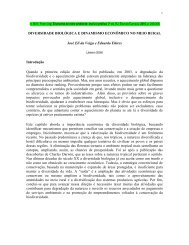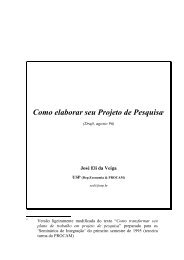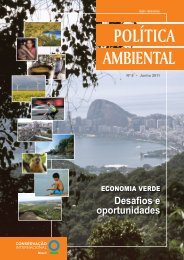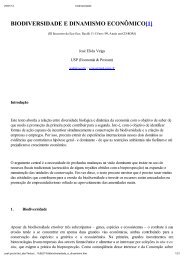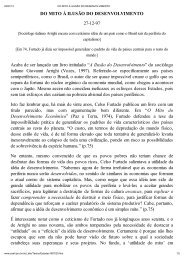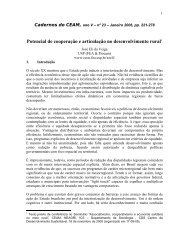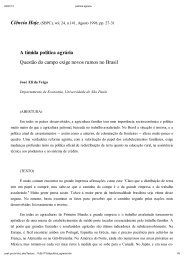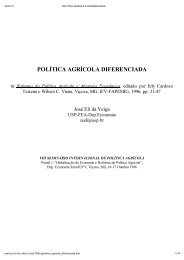sustainable development 20 years on from the ... - José Eli da Veiga
sustainable development 20 years on from the ... - José Eli da Veiga
sustainable development 20 years on from the ... - José Eli da Veiga
You also want an ePaper? Increase the reach of your titles
YUMPU automatically turns print PDFs into web optimized ePapers that Google loves.
252<br />
Given <strong>the</strong> size of <strong>the</strong>ir ec<strong>on</strong>omies, waste management in <strong>the</strong>se countries needs regi<strong>on</strong>al<br />
cooperati<strong>on</strong> to create shared infrastructure <strong>on</strong> an appropriate scale for dealing with waste and <strong>da</strong>ngerous<br />
pollutants and to explore possibilities for generating clean, low-carb<strong>on</strong> energy <strong>from</strong> waste.<br />
If marine and coastal resources and biodiversity are to be properly managed, <strong>the</strong> ec<strong>on</strong>omies must<br />
internalize <strong>the</strong> costs of coastal and marine degra<strong>da</strong>ti<strong>on</strong>, especially that caused by land-based pollutants.<br />
Local ec<strong>on</strong>omic incentives and disincentives are <strong>the</strong>refore crucial, as is subregi<strong>on</strong>al maritime transport,<br />
including for tourism. Regi<strong>on</strong>al cooperati<strong>on</strong> can also help to generate ec<strong>on</strong>omies of scale in <strong>the</strong><br />
management and use of shared resources (such as fisheries) and in <strong>the</strong> protecti<strong>on</strong> of critical ecosystems,<br />
particularly in transboun<strong>da</strong>ry or multinati<strong>on</strong>al marine and coastal c<strong>on</strong>servati<strong>on</strong> areas.<br />
Regulatory issues are crucial to <strong>the</strong> sustainability of <strong>the</strong> tourism industry. The rules applicable to<br />
tourism must be harm<strong>on</strong>ized across <strong>the</strong> subregi<strong>on</strong> to maintain competitiveness and capital mobility. Areas<br />
such as energy and telecommunicati<strong>on</strong>s can benefit <strong>from</strong> regi<strong>on</strong>al coordinati<strong>on</strong> for similar reas<strong>on</strong>s.<br />
D. INTERNATIONAL CONDITIONS FOR MOVING FORWARD WITH<br />
THE CROSS-CUTTING GUIDELINES<br />
Internati<strong>on</strong>al cooperati<strong>on</strong> (in <strong>the</strong> form of financing or technology transfer) and <strong>the</strong> terms of internati<strong>on</strong>al<br />
trade are not sufficient, ei<strong>the</strong>r in relati<strong>on</strong> to commitments made or <strong>the</strong> regi<strong>on</strong>’s needs. The regi<strong>on</strong> still<br />
faces internati<strong>on</strong>al market barriers to its products, especially those of higher value added. With a few<br />
notable excepti<strong>on</strong>s, developed countries have not h<strong>on</strong>oured <strong>the</strong>ir commitments to provide financial<br />
assistance, or shown leadership in alleviating global public bads such as climate change. There are some<br />
examples of successful technology transfer in specific areas, in particular under multilateral<br />
envir<strong>on</strong>mental or trade agreements, but technological weaknesses and <strong>the</strong> world intellectual property<br />
system limit those transfers. On <strong>the</strong> trade fr<strong>on</strong>t, <strong>the</strong> outcome of <strong>the</strong> Doha Round is still pending. The<br />
current state of multilateral governance has been incapable of addressing <strong>the</strong> pressing challenge of<br />
achieving greater c<strong>on</strong>sistency between <strong>the</strong> c<strong>on</strong>diti<strong>on</strong>s arising <strong>from</strong> global mechanisms and forums and <strong>the</strong><br />
real needs of countries of <strong>the</strong> regi<strong>on</strong>.<br />
In this regard:<br />
(a)<br />
Developed countries must comply with <strong>the</strong> objective, proclaimed under General Assembly<br />
resoluti<strong>on</strong> 2626 (XXV), of devoting 0.7% of <strong>the</strong>ir gross nati<strong>on</strong>al income (GNI) at market<br />
prices to official <str<strong>on</strong>g>development</str<strong>on</strong>g> assistance (ODA). This commitment was reaffirmed by <strong>the</strong><br />
developed countries at <strong>the</strong> United Nati<strong>on</strong>s C<strong>on</strong>ference <strong>on</strong> Envir<strong>on</strong>ment and Development<br />
(1992) and at subsequent summits<br />
The shortfall to<strong>da</strong>y is close to 50% of that commitment (see chapter V), and more systematic and<br />
transparent m<strong>on</strong>itoring of <strong>the</strong>se flows is <strong>the</strong>refore needed at <strong>the</strong> internati<strong>on</strong>al level. If <strong>the</strong> commitment<br />
c<strong>on</strong>tained in resoluti<strong>on</strong> 2626 (XXV) were fully realized, <strong>the</strong> additi<strong>on</strong>al funding for <strong>the</strong> Latin American<br />
and Caribbean regi<strong>on</strong> would amount to US$ 9 billi<strong>on</strong>, assuming its share in <strong>the</strong> world total remained<br />
c<strong>on</strong>stant. Accordingly, it would be advisable to reach a regi<strong>on</strong>al agreement <strong>on</strong> <strong>the</strong> priorities for using<br />
<strong>the</strong>se resources. In additi<strong>on</strong>, assistance for generating global goods and services must be differentiated<br />
<strong>from</strong> traditi<strong>on</strong>al official <str<strong>on</strong>g>development</str<strong>on</strong>g> assistance.



